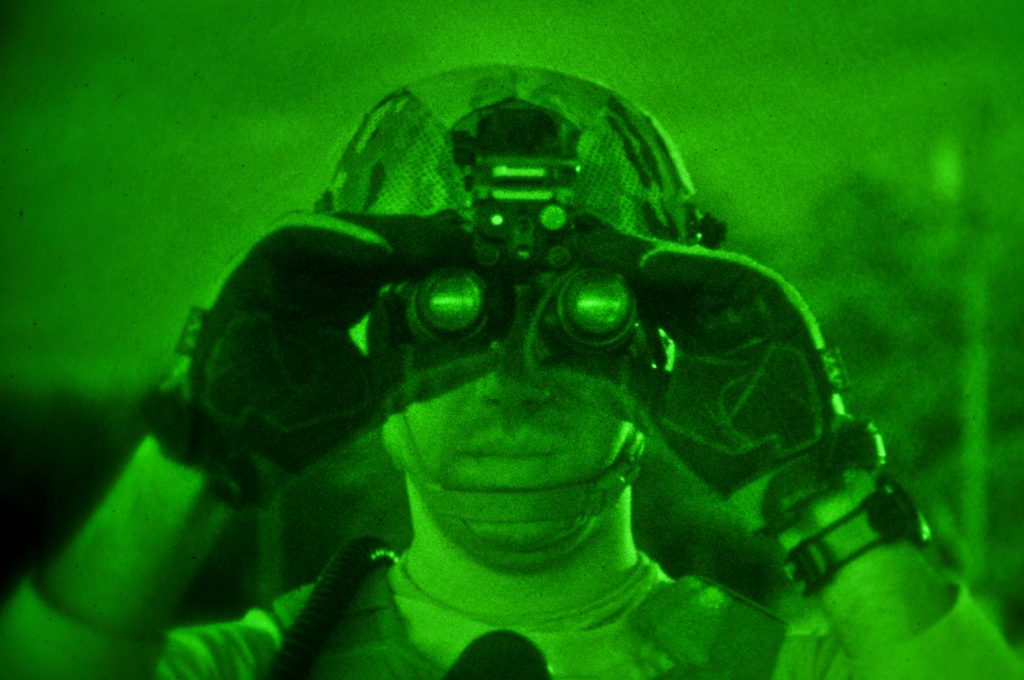
U.S. Air Force 1st Lt. Andrew Bruno adjusts his night vision goggles on April 10, 2014 at Fort Dix, N.J. The New Jersey Army and Air National Guardsmen took part in a joint training exercise with the U.S. Marine Corps. Bruno is an air laison officer from the New Jersey Air National Guard’s 227th Air Support Operations Squadron. (U.S. Air National Guard photo by Tech. Sgt. Matt Hecht/Released)
Poor night vision can be caused by a lot of things. Disease, lack of nutrition, and even exposure to bright light are just a few contributing factors. Even people who have excellent vision and eye health can find themselves struggling to see clearly at night to one degree or another. Fortunately, there are a number of things that we can do to improve our vision, and the results can be amazing.
Nutritional Support
Did you know that one of the main symptoms of a vitamin A deficiency is poor night vision? Vitamin A benefits the eyes in a number of ways, but two things stand out in particular. First, vitamin A contains a compound that the retina uses to process light. Another is that vitamin A plays a vital role in the functioning of membranes in they eye that help us to focus. It also doesn’t take a lot of vitamin A to give the eyes what they need nutritionally, and a serving or two of foods with beta carotene a few times a week can be more than enough. You can also take a supplement every other day or so, adjusting dosage depending on how much improvement you experience. The only problem with vitamin A is that too-much can be a bad thing, so don’t overload the body with high doses.
Fatty Acids and Free Radicals
Our eyes need omega-3 fatty acids to function properly, and these are primarily found in fish, which is something that most Americans don’t get enough of. Make sure that you’re eating fatty fish a couple of times a week or taking fish oil supplements to offset any deficiencies. Another big contributor to poor night vision is the presence of free radicals, and these can be eliminated by eating foods that are high in antioxidants.
Tinted Lenses
Wearing red-tinted lenses can help the eyes to adjust to seeing clearly in low light, and wearing them for a few minutes before heading out in the dark can produce a noticeable improvement. You should also consider getting a red filter for your flashlight because this will preserve your night vision as you are using it to read something or look at a map.
Avoid Looking at Light
The pupils in our eyes expand in the dark in order to take in as much light as possible. However, when we look directly at light, they contract. When this happens at night, they contract suddenly to protect our eyes, but then it takes a few minutes for them to open back up. Consequently, looking directly at light can interfere with our night vision for a few minutes. If you’re encountering a light source in a dark environment, such as a headlight or bright lamp, cast your gaze to the side to reduce the amount of adjustments that the pupils have to make.
Give it Time
Along those lines, it’s important to note that it can take up to a half hour before eyes fully-adjust to seeing at night, and this is particularly true when going from lighted place to darkness without transitioning first. Give yourself a few minutes to acclimate before venturing-off, and chances are that you’ll see lot more clearly.
Move Your Eyes
Eyes are very sensitive to light at night, and they will adapt to whatever light source is around at the time. Moving the eyes helps them to adjust to varying-degrees of darkness, and these micro-adjustments will happen faster once the eye is trained. This can lead to faster focusing and better clarity over the course of time.
While none of us will be able to see perfectly at night without some kind of assistive device, we can see better. These are things that we can all put into practice without a lot of difficulty, and they have an excellent chance of producing results. Try them for yourself, and feel free to share any other tips that can help the rest of us to see better too.
